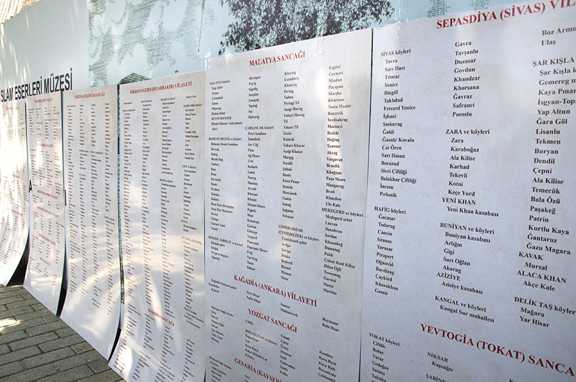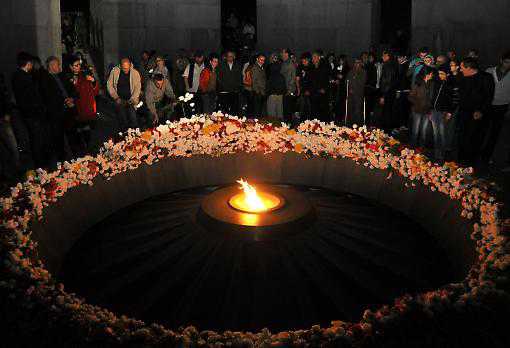Names of destroyed Armenian villages
BY AYSE GUNAYSU
From The Armenian Weekly
ISTANBUL—It’s April 24, 2013. In Sultanahmet Square in Istanbul. People have gathered in front of the Turkish-Islamic Arts Museum which, in 1915, served as the Central Prison that held Armenian intellectuals kept before they were sent to their deaths. But something very unusual is happening. From a loudspeaker, people hear some Armenian names of places. The names of lost Armenian villages. The voice says: “Vaspuragan province… Avants… Lezk… Shahbaghi… Akhzia… Shoushants… Kouroubash… Gentanants… Pertag… Dzevestan… Ardamed… Tarman… Vosgepag…”
There are big panels on the wall, showing these names and the provinces or districts they are connected to. People come and take photographs. I recognize some of them; Armenians from abroad with a delegation are visiting Istanbul for the commemoration activities, taking photographs of these names from a certain province. I guess these are the provinces of their ancestors.
Eren Keskin starts to speak as the volume of the sound and voices goes down.
“These names you are hearing now are the names of the Armenian villages in Asia Minor before 1915, together with the provinces and districts they belong to—a total of 2,300 settlements. In fact, they are more in number. The work to compile the names of all the Armenian settlements before the genocide is still under way. Our guest, Historian Ara Sarafian, the director of the Gomidas Institute based in London, will give more details of this work.
Commemoration in Taksim
“The names you listen to now, constitute the solid proof of the genocide. The Armenian communities living in these villages were annihilated. They changed the names. Some of them were wiped off the map altogether; some became the home of others. “We wanted our ears to hear these names. We wanted them to penetrate deep into our souls. Here, on these panels, you can see them. You can come closer and read them one by one. These are lost Armenian communities. We want the Turkish people to remember and never forget these names.”
Then the volume rises again, and we listen to the names of the lost villages for another five minutes.
When death becomes a salvation
Keskin continues, “The genocide put an end to the social existence of Armenians and other Christian peoples of what is now Turkey by exterminating not only their lives but also their institutions, cultural and social organizations, their historical heritage, their civilizations, even the traces of their mere existence.
“Genocide is not only the massacres. Genocide is also dehumanizing people by putting them in circumstances where death becomes a salvation, something they crave to put an end to their suffering. But genocide is not only condemning people to inhuman conditions. It as also an enormous plunder, a wide-scale robbery of the wealth created by generations through skillful and hard work.
“And the Genocide still goes on. It continues through its denial. It goes on with the audacious, shameless lies told to people’s faces. It continues with the hatred and hostility that targets Armenians and other non-Muslims in Turkey. It continues by terrorizing Armenians in Samatya with brutal attacks on old Armenian women, the children of genocide survivors. It continues through an environment that doesn’t allow Armenians to feel safe in Turkey. This fact was dramatically demonstrated with what happened to Sevag Şahin Balıkçı, who was shot dead in Batman, Turkey, while he was serving the Turkish Armed Forces, on April 24, 2011, the day of the commemoration of the Armenian Genocide, and the day the court ruled that his death was an accident.
“We, the human rights defenders, repeat one more time: Officially recognize the genocide! This is a call to the government of the Republic of Turkey, as well as the Turkish public. Return the property seized during and after the genocide to the descendants of the owners. Compensate all of the material and immaterial damage done. Recognize the rights of Armenians scattered all around the world—their legitimate right to their homeland.
“Without recognition of the genocide, without confronting the crimes committed, no peace, no real democracy, no justice can ever be attained in this country.
“Refusal to recognize the genocide is a confirmation of the possibility of new genocides.
Therefore we once more demand that the Turkish authorities put an end to the denial of genocide! We want JUSTICE to be served!”
Ara Sarafian then speaks in Armenian, with simultaneous translation to Turkish by a young Armenian, a member of the Nor Zartonk socialist Armenian group. He talks about the futility of denialism in the face of bare facts, about the growth in the number of people joining the genocide commemoration events in Turkey, about his visit to Diyarbakir and his interviews with the local people—how truthful many of them were about the genocide, how one of them talked about his grandfather who participated in the massacres.
‘Sayfo’ commemorated publicly for first time
It was the first time that Sayfo, the Assyrian Genocide, was mentioned in the commemorations in Turkey, and that an Assyrian, a representative of the Sweden Assyrian Youth Federation, gave a speech, too. Referring to the ongoing “peace process” in Turkey to put an end to the war between the Turkish Army and the PKK, he said: “To our dismay, these crimes against humanity committed against the ancient peoples of Anatolia have always been denied by all governments to this day. It is clear that the pursuit of peace at the present will be futile without facing the past. A state of peace based on faith and religion will hang like Damocles’ sword on different peoples, just as in the events of the past. Truly establishing peace in these lands will be possible not by the denial of the crimes against humanity committed against the ancient peoples of Anatolia, but by facing them. The establishment of peace will have meaning when it is built not on common faith but on human values.” His speech was translated to the Assyrian language by his colleague. It was the first time the Assyrian language was heard by the people gathered for a commemoration of the genocide.
The co-chair of the Kurdish Peace and Democracy Party’s Istanbul Organization then gave a speech, recognizing the Kurds’ involvement in the genocide. “I, as a Kurd and a Kurdish politician, apologize again and again to Armenians and Assyrians for the role played by the Kurds in the genocide,” he said.
After a speech by another Kurd, the owner of the Peri Publishing House, which published a book about Antranig Pasha, said he condemned those Kurds who cooperated with the central government and took part in the massacres and the plunder of Armenian property.
Nor Zartonk’s press statement was also read aloud by a young Armenian, a member of the group.
An international delegation had also come to Istanbul this year within the framework of the program jointly developed by the Turkish group “Say Stop to Racism and Nationalism” (DurDe), the European Grassroots Anti-Racist Movement (EGAM), and the Armenian General Benevolent Union (AGBU). The president of EGAM, Benjamin Abtan gave a short speech expressing the group’s solidarity in the struggle against denialism in Turkey.
Following the commemoration, the delegation and the participants of the event visited the Sisli Armenian Cemetery and the grave of Sevag Şahin Balıkçı.
Before the commemoration at the Sultanahmet Square, Ara Sarafian, accompanied by others, had visited the grave of Ali Faik Bey (Ozansoy), the governor of Kütahya who had refused to obey the central government’s deportation orders and had protected the Armenian community there.
At 6:30 p.m., DurDe’s commemoration took place in Taksim Square. The crowd was bigger in Taksim—numbering about 1,000—as compared to Sultanahment, where there were about 200. Armenian music played throughout the event, excerpts were read from the memoirs of a number of Armenian intellectuals who were arrested on April 24, 1915, and a press release was read out condemning the genocide.
Commemoration in Diyarbakir
Diyarbakir is the only city in Turkey that officially and publicly recognizes the Armenian Genocide. “Both the conference hosted by the Diyarbakir Bar Association and the commemoration organized by the municipality under the leadership of Mayor Osman Baydemir were very impressive and fruitful,” said Sarafian. The commemoration took place on the bridge over the Tigris River where the Diyarbakir Armenians were massacred. Participants threw flowers into the river in the memory of the victims. Sarafian was deeply moved not only by the sincere willingness of the municipality, first and foremost Mayor Baydemir, but also by the readiness local Kurds to accept the truth. “We should not take for granted Osman Baydemir’s promise of wide open doors to Armenians, and should develop new ways of strengthening these ties with Diyarbakir and turn this potential into reality,” he said.






